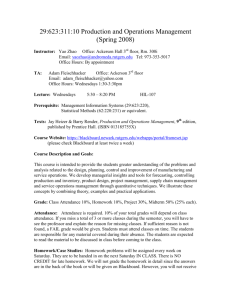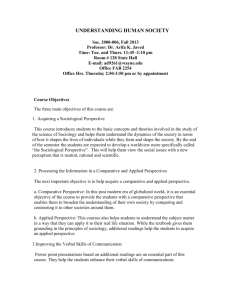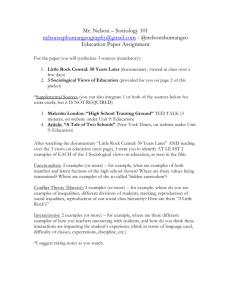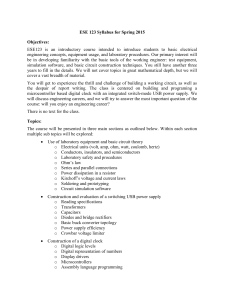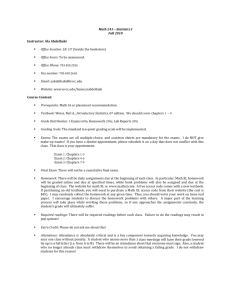Syllabus - Florida International University
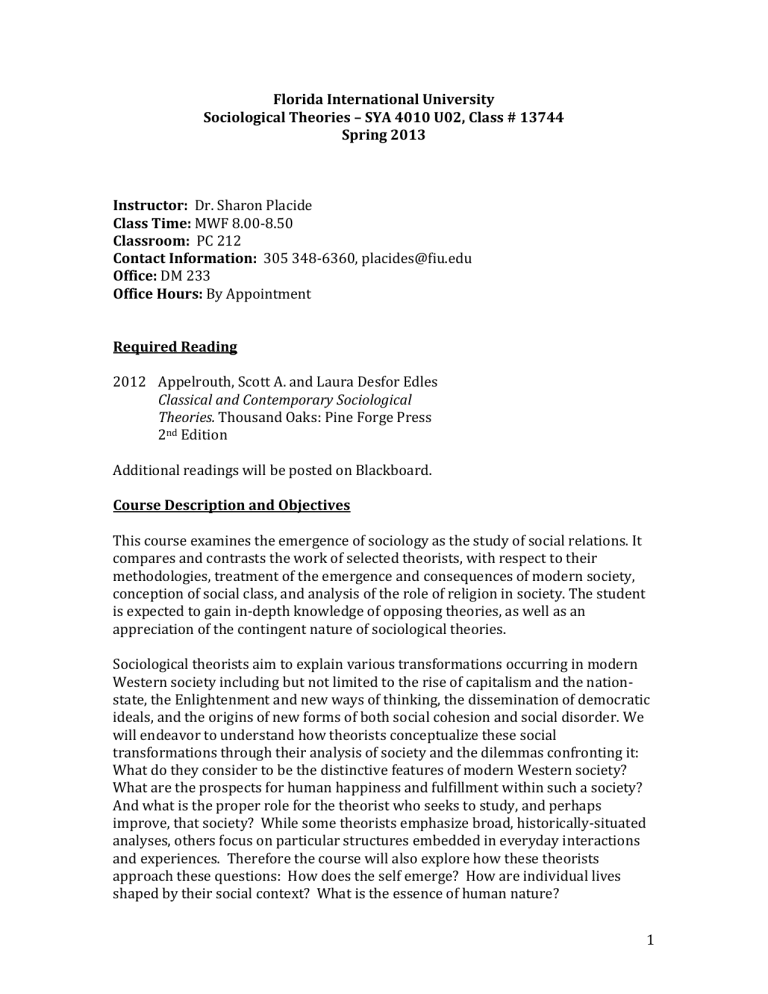
Florida International University
Sociological Theories – SYA 4010 U02, Class # 13744
Spring 2013
Instructor: Dr. Sharon Placide
Class Time: MWF 8.00-8.50
Classroom: PC 212
Contact Information: 305 348-6360, placides@fiu.edu
Office: DM 233
Office Hours: By Appointment
Required Reading
2012 Appelrouth, Scott A. and Laura Desfor Edles
Classical and Contemporary Sociological
Theories. Thousand Oaks: Pine Forge Press
2 nd Edition
Additional readings will be posted on Blackboard.
Course Description and Objectives
This course examines the emergence of sociology as the study of social relations. It compares and contrasts the work of selected theorists, with respect to their methodologies, treatment of the emergence and consequences of modern society, conception of social class, and analysis of the role of religion in society. The student is expected to gain in-depth knowledge of opposing theories, as well as an appreciation of the contingent nature of sociological theories.
Sociological theorists aim to explain various transformations occurring in modern
Western society including but not limited to the rise of capitalism and the nationstate, the Enlightenment and new ways of thinking, the dissemination of democratic ideals, and the origins of new forms of both social cohesion and social disorder. We will endeavor to understand how theorists conceptualize these social transformations through their analysis of society and the dilemmas confronting it:
What do they consider to be the distinctive features of modern Western society?
What are the prospects for human happiness and fulfillment within such a society?
And what is the proper role for the theorist who seeks to study, and perhaps improve, that society? While some theorists emphasize broad, historically-situated analyses, others focus on particular structures embedded in everyday interactions and experiences. Therefore the course will also explore how these theorists approach these questions: How does the self emerge? How are individual lives shaped by their social context? What is the essence of human nature?
1
Students will be asked to hone their skills of analysis and self-expression as part of their efforts to synthesize theorists' ideas and construct meaningful arguments about the nature of collective existence.
Course Learning Outcomes
By the end of the semester students should be able to:
1.
Identify and analyze a range of sociological theoretical perspectives
2.
Understand the main substantive arguments and theoretical concepts developed by the classical and modern sociological theorists
3.
Recognize the ways in which societal issues and transformations have continually informed the production of sociological theory
4.
Discuss how it is that social, political, and economic change lead to revisions and new directions in theoretical understandings/explanations
Class Structure
This is an upper-level undergraduate seminar. Although classes will include lectures, class time will consist primarily in discussing and debating the material.
This means that students must come to class having critically read the assigned materials and viewed the online lecture notes so that we can grapple with ideas. Class participation is critical to the success of a seminar so students are expected to participate avidly in class discussions and will be evaluated accordingly.
Course Requirements
Presentations (20 points)
Each student will deliver a brief presentation (15-20 minutes) on one theorist or theoretical perspective. Depending on the size of the class, students will present in pairs or small groups. During the second week of classes, students will select the topic on which they would like to do their presentations. For presentations, students will respond to questions assigned by the instructor. The questions will be posted at least one week before each scheduled presentation. Presentations will generally be done on Fridays, or at the end of the topic. More information will be provided about the presentations. The presentations will be worth 20 points.
Analytical Essays (20 points)
2 essays 3-4 pages, that each discusses the perspective(s) of one sociological perspective/theorist. Each essay will be worth 10 points, or 10 percent of the overall grade (total 20 percent). Detailed instructions will be posted on Blackboard two weeks before each essay is due. The essays will be due on February 18 and
April 8.
2
Exams (40 points)
There will be 2 in-class examinations: a midterm and a final exam. Exams will be based on lectures and assigned readings. Each will consist in essay questions, and will be administered at the start of class. Blue books are required for the exams. The midterm exam will be worth 15 points, 15% of the overall grade. The final exam will be worth 25 points or 25% of the overall grade. (Total 40%)
Make-up exams will be permitted for the midterm only in the event of unforeseen and documentable emergencies. Requests for make-up exams and the required documentation must be submitted to the instructor no later than one week following the midterm exam. Given time constraints (grades are generally due very soon after exam week) there will be no make-up for the final.
Attendance and Participation (20 points)
Class attendance is required. Attendance will be taken at each class and will be worth 5 points, or 5 percent of your overall grade. I will permit three absences that do not require documented excuses. For each additional absence without a documentable excuse, the attendance grade will be lowered by a grade point. See below statement for details on my attendance policy.
Participation is worth 15 points or 15 percent of your overall grade, and will be assessed in the following ways:
1.
Five (5) unannounced reading quizzes will be given (5 points). Quizzes are designed to ensure that students are completing required readings. Each quiz will therefore be based on assigned reading(s) for the week, and will be given in the first 10-15 minutes of the class session. Note: you will not be advised of quiz dates. Should you be late or absent on the day a quiz is given, you will receive a failing grade. There will be no opportunity to make-up quizzes.
2.
Contribution to class discussion. (10 points) Students who are uncomfortable with public speaking may earn points by: 1) meeting with the instructor to discuss course material 2) posting comments on the course discussion board.
A high participation score will be achieved by students who do well in the quizzes, regularly participate in class discussion/post discussion board, and who demonstrate the ability to critically assess the material covered.
Grading
Grades will be assigned as follows:
Attendance
Participation
= 5%
= 15%
3
Presentations
Essays
Midterm Exam
Final Exam
= 20%
= 20%
= 15%
= 25%
Grading Scale
100-93 = A
92-90 = A-
89-87 = B+
86-83 = B
Academic Misconduct
82-80 = B-
79-77 = C+
76-73 = C
72-70 = C-
69-67 = D+
66-63 = D
62-60 = D-
59 and below = F
Florida International University is a community dedicated to generating and imparting knowledge through excellent teaching and research, the rigorous and respectful exchange of ideas, and community service. All students should respect the right of others to have an equitable opportunity to learn and honestly to demonstrate the quality of their learning. Therefore, all students are expected to adhere to a standard of academic conduct, which demonstrates respect for themselves, their fellow students, and the educational mission of the University. All students are deemed by the University to understand that if they are found responsible for academic misconduct, they will be subject to the Academic
Misconduct procedures and sanctions, as outlined in the Student Handbook.
Please for additional information see:
Policies on Academic Misconduct
Expectations and Other Notes
1.
You are expected to attend class regularly, arrive on time, and turn cell
phones and personal computers, iPads, iPods, etc. off before class begins.
2.
You are expected to be respectful and tolerant of others’ comments and opinions in class.
3.
You are expected to stay current with the course by following the course schedule and being aware of important dates.
4.
If you cannot attend a class meeting, you are responsible for checking in to see what you missed (handouts, etc.) and for getting notes, if desired, from a classmate. I will not, under any circumstances, directly provide lecture notes to students.
5.
I will offer limited extra credit opportunities. More information will be provided early in the semester.
6.
I strongly encourage you to speak up and ask for clarification whenever necessary, both in class and during office hours.
4
Attendance Policy
Attendance will be taken at each class. Three unexcused absences are permitted.
Students are required to provide documentable excuses (such as a doctor’s note on appropriate letter head) for any additional absences. Any films shown in class are an important component of the course and will be treated as such in exams. Students are expected to be on time for class and to stay for the duration of the class.
Students with Disabilities
Every effort will be made, where feasible and practical, to accommodate students with physical and mental challenges. Should you require accommodations, contact the Disability Resource Center, if you have not done so already.
Blackboard
Blackboard will be used to provide additional support for this course and is a required component of this course. To log in to Blackboard, go to http://online.fiu.edu/login/ecampus and follow directions provided there.
Please Note:
I will make frequent use of your FIU email account. It is your responsibility to regularly check your FIU account to ensure you receive all my messages. Messages may refer to assignments, schedule changes and other important course-related issues.
This syllabus is subject to change as the need arises. Students will be advised of any change made to the syllabus.
COURSE TOPICS AND SCHEDULE
Week
CLASSICAL PERSPECTIVES
Week 1
Jan 7-11
Topic/Assignment
Introduction to Theory – Rise of Theoretical
Sociology
Readings:
5
Feb 4-8
Week 6
Feb 11
Feb 11-15
Week 7
Feb 18-22
Week 8
Feb 25-Mar 1
Mar 1
Week 9
Mar 4-8
Week 2
Jan 14-18
Week 3
Jan 21
Jan 23-25
Week 4
Jan 28- Feb 1
Feb 1
Week 5
Appelrouth and Edles, Introduction
Recommended: Turner et. al. Chapter 1
(Blackboard)
August Comte
Readings: Turner et al. Chapters 2 & 3
(Blackboard)
MLK Holiday
Karl Marx
Reading: Appelrouth and Edles, Chapter 2
Karl Marx continued
Begin Emile Durkheim
Reading: Appelrouth and Edles, Chapter 3
Emile Durkheim continued
First Essay Due
Max Weber
Reading:
Appelrouth and Edles, Chapter 4
Charlotte Perkins Gilman
Reading: Appelrouth and Edles, Chapter 5
(Blackboard)
Review and Midterm
Midterm Exam
Georg Simmel
6
Week 10
Mar 11-15
CONTEMPORARY PERSPECTIVES
Reading: Appelrouth and Edles, Chapter 6
Spring Break
Week 11
Mar 18-22
Week 12
Mar 25-29
Week 13
Functionalism/Structural Functionalism
Reading: Appelrouth and Edles, Chapter 9
Exchange/Rational Choice Theories
Reading:
Appelrouth and Edles, Chapter 11
Apr 1-5
Week 14
Apr 8
Apr 8 -12
Symbolic Interactionism
Reading:
Appelrouth and Edles, Chapter 12
2 nd Essay Due
Phenomenology
Readings:
Appelrouth and Edles, Chapter 13
Week 15
Apr 15-19
Week 16
Apr 22-26
TBA
Poststructural and Postmodern Theories
Reading:
Appelrouth and Edles, Chapter 15
Final Exam Week
Final Exam
7
